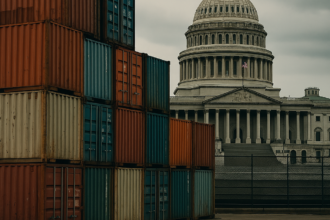US investment bank Jefferies recently published an analysis that draws attention to the escalation of trade tensions between the United States and Latin American countries, especially Mexico. The report maps six possible developments of this clash — each with direct implications for the global economy, and especially for Brazil.
According to the analysis, scenarios range from a quick diplomatic resolution, through moderate reprisals, to a full-scale trade war, with the imposition of tariffs, technological restrictions and impacts on the production chain of strategic sectors such as automobiles, electronics and agribusiness.
What does this mean for Brazil?
Brazil, which until now had been watching the tensions between China and the US from the sidelines, may now find itself in the middle of a new geopolitical and commercial rearrangement. Depending on the scenario that materializes, there are both risks and opportunities on the horizon:
- Risks: Repositioning of foreign investments, exchange rate effects, increased competition for external markets and instability in global chains.
- Opportunities: Attracting companies seeking to diversify their production outside of Mexico, trade gains from exports of products subject to sanctions between rivals, and even greater diplomatic influence in the Latin American bloc.
Adaptation is the name of the game
Companies and governments will need to monitor developments with strategic attention. With geopolitical intelligence and economic coordination, Brazil can transform a scenario of uncertainty into a window of growth and global repositioning.





